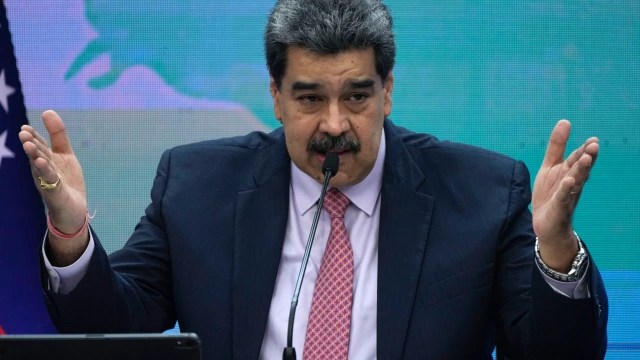
Totalitarian regimes hold on to power with an iron fist. They are tough and lethal with those who oppose them but also apply similar rules for those within their inner circle. As Machiavelli said: “politics have no relation to morals.”
By The Hill – Aaturo McFields Yescas
Mar 22, 2023
In 1934, the Adolf Hitler regime carried out a series of political assassinations in order to eliminate all those uncomfortable friends and guarantee absolute loyalties. That action was called “Operation Hummingbird” or the “Night of the Long Knives.”
In Cuba, Fidel Castro was a master of the strategy of political purges, even revolutionary guerrilla Ernesto “Che” Guevara could not escape from it. In Nicaragua, Daniel Ortega sent to jail his former comrades-in-arms, including those who saved his own life in the past.
Today, Venezuela lives its own night of the long knives. Nicolás Maduro has begun a so-called internal “anti-corruption” purge in which the oil czar has fallen. According to opposition leader Juan Guaidó, “No internal struggle will get them to wash their hands. They intend to continue stealing and clinging to power, aggravating the daily lives of millions. Not even in a Narcos series was there such impudence.”
Journalists like Ibéyise Pacheco point out that what happened in Caracas is the result of a political train wreck. A scuffle between National Assembly President Jorge Rodríguez and Vice President Delcy Rodríguez against the former oil minister Tareck El Aissami.
Ryan Berg, the director of the Center for Strategic and International Studies’ Americas Program, considers that the so-called corruption campaign is part of Chavismo’s shifting grounds, as factions move to cannibalize one another.
“Authoritarian regimes like Nicolás Maduro’s never use anti-corruption campaigns as anti-corruption campaigns,” Berg wrote.
In this new scheme of oil, power and purges, El Aissami collapsed quickly and cautiously. His resignation as oil minister on Monday, included expressions of unconditional support for the regime’s alleged anti-corruption fight.
Maduro, who is accused of drug trafficking by the Manhattan U.S. Attorney’s Office, said the fight against corruption has been bitter and painful. He also has told public officials to sacrifice themselves and selflessly serve the country. In other words, do as I say, not as I do.
Lessons from the Chavismo anti-corruption purge
Venezuela is the most corrupt country in the Américas and the fourth worldwide, according to the latest report by Transparency International. That is why the fight against corruption either does not exist or has other purposes.
Eric Farnsworth, head of the Office of the Council of the Américas in Washington, said that Venezuela and China use the fight against corruption as a tool to purge the party and solidify political control. Anti-corruption “crusades” are often just farfetched, barely disguised.
The dictatorship of Venezuela has not changed a bit. It is a regime of the strong man and weak institutions. Everything, including the judiciary, are weapons to subdue opponents and purge fellow party members.
The new internal quarrel within Chavismo seems to have multiple purposes. It could seek to appease internal competition, rearrange the distribution of the loot state and offer a possible token for trade to the United States. I guess we have to wait see.
The war against corruption does not exist. If that were the case, the first to fall would be Maduro, on whom a bounty of $15 million USD weighs. This should also include those responsible for torture and crimes against humanity, the protagonists of reported ecocide in the Mining Arc and the ominous business of blood gold.
The Venezuelan regime seeks legitimacy. Like the Nicaraguan dictatorship, Maduro desperately seeks to whitewash his image and remove sanctions. The anti-corruption narrative fits like a glove with the supposed dialogue, economic recovery, the fight against drug trafficking and other Aesop fables.
Beyond the official narrative, what Venezuela needs is a real change, without dictatorship and with real democracy. The change must start with the immediate and unconditional release of Venezuela’s 282 political prisoners. The country needs a road map to return to democracy and to ensure the holding of free and fair elections that include the more than 7 million Venezuelans who had fled the county and oppression under the regime. This can be a good starting point.
…
Read More: The Hill – Venezuela’s oil, power and purges
…

